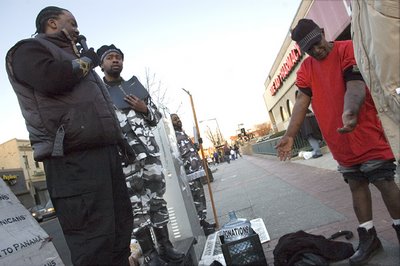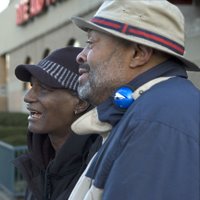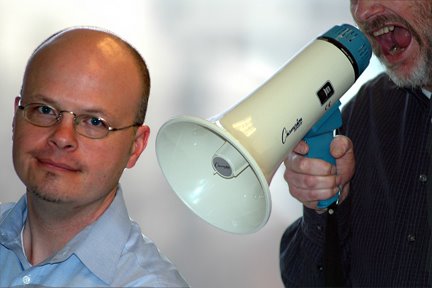Good or Bad, There's No Need for Noise
 (CLICK TO ENLARGE) Apparently inspired by the preachers on Saturday, March 4, a man addicted to drugs weeps as he shed his coat to display his arms and legs. They were swollen and covered in scabs. Despite the close proximity of the men, the amplifier still was employed. (Copyright © 2006. David Klavitter)
(CLICK TO ENLARGE) Apparently inspired by the preachers on Saturday, March 4, a man addicted to drugs weeps as he shed his coat to display his arms and legs. They were swollen and covered in scabs. Despite the close proximity of the men, the amplifier still was employed. (Copyright © 2006. David Klavitter)Amplifier aside, the message spouted by fellows from the Israeli School of Universal Practical Knowledge (ISUPK) every Saturday at the corner of H and 8th Streets NE is polarizing. I’ve seen people respond to the preachers angrily and defiantly. I’ve also observed people shout words of support, bump fists, and drop money in the donation container. And some people are moved beyond words.
It was cold and windy Saturday (March 4), and few people milled about at the four bus stops posted at the busy intersection. In between the preachers' flinging insults at me and other passersby, I noticed two fellows who appeared mesmerized by the ISUPK’s dramatic street theatrics.
 (CLICK TO ENLARGE) The man who would eventually remove his coat (left) and Tony weep as they listen within feet of the amplified preachers. (Copyright © 2006. David Klavitter)
(CLICK TO ENLARGE) The man who would eventually remove his coat (left) and Tony weep as they listen within feet of the amplified preachers. (Copyright © 2006. David Klavitter)Soon, both men began to weep and openly reflect on the condition of their lives, mainly derailed by the use of drugs. Then, in an apparent public confession, one of the men shed his coat and rolled up his shirt sleeves and pant legs to reveal limbs, swollen and covered in scabs.
The preacher dubbed “The Hurler,” who earlier had been heaving not-so-kind words my way, advised the man all was not lost: He could kick the drug habit by starting small. He advised the coat-less man to stop eating pork first, then move onto bigger challenges, gaining strength to beat the drugs.
After an exchange of hugs between both men and the preachers, they helped the man back into his coat.
Meanwhile, I spoke with the other man, who told me his name was Tony. Tony lived north of East Capitol Street. He’d been seeking treatment for his habit—he didn’t tell me the nature—but that he’d not always had success. He told me that the preachers were “right on.” Then he hugged me.
I’m not aware of what other help or advice ISUPK offered to the men. I’m certainly not equipped to deal with these issues—beyond listening and a hug, I wasn’t much of a boost.
No matter how one feels about the ISUPK’s message—or whether the group’s presence helps or hinders the community—it is clear to me that these issues would still remain if the group stopped using the amplifier. These exchanges all happen on the sidewalk within 10-feet of the ISUPK’s assembled stage, showing no clear need for the neighborhood to be blasted all afternoon by an electrified loudspeaker.
Let’s solve this noise issue so we can work together to help people like Tony and the man who shed his coat.
 (CLICK TO ENLARGE) Tony (left) talks to one of the ISUPK fellows a few feet from the amplifier in front of the Sports Zone at the corner of H and 8th Streets NE. (Copyright © 2006. David Klavitter)
(CLICK TO ENLARGE) Tony (left) talks to one of the ISUPK fellows a few feet from the amplifier in front of the Sports Zone at the corner of H and 8th Streets NE. (Copyright © 2006. David Klavitter)


0 Comments:
Post a Comment
<< Home